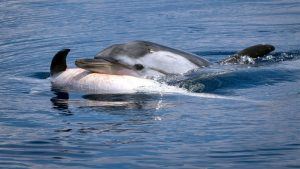Virginia Morell in Science:
 When an adult striped dolphin emerged from the Mediterranean Sea in 2016 pushing, nudging, and circling the carcass of its dead female companion for more than an hour, a nearby boat of scientists fell silent. Afterward, the students aboard said they were certain the dolphin was grieving. But was this grief or some other response? In a new study, researchers are attempting to get to the bottom of a mystery that has plagued behavioral biologists for 50 years.
When an adult striped dolphin emerged from the Mediterranean Sea in 2016 pushing, nudging, and circling the carcass of its dead female companion for more than an hour, a nearby boat of scientists fell silent. Afterward, the students aboard said they were certain the dolphin was grieving. But was this grief or some other response? In a new study, researchers are attempting to get to the bottom of a mystery that has plagued behavioral biologists for 50 years.
Grief, in humans at least, is a reaction to the permanent severing of a strong social or family bond. Although chimpanzees, baboons, and elephants are thought to experience the complex emotion, scientists don’t yet know enough about it in other animals. There are dozens of photos and YouTube videos of grieflike behavior in dolphins: Some mothers have been seen carrying their dead infants in their mouths or on their backs for a week or longer, even as the body decomposes; a couple adult males have also been seen holding dead calves in their mouths.
In the new study, cetacean biologist Giovanni Bearzi of Dolphin Biology and Conservation in Pordenone, Italy, and his colleagues at other institutions analyzed 78 scientific reports from 1970 to 2016 of these kinds of displays—which they labeled “postmortem-attentive behavior.” They found that just 20 of 88 cetacean (dolphin and whale) species engage in them. Of those, most were dolphins from the Sousa and Tursiops genera. Just one was a baleen whale—a humpback.
More here.
